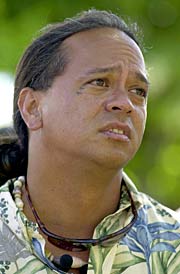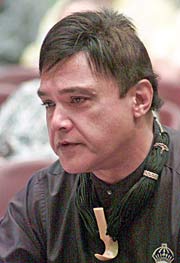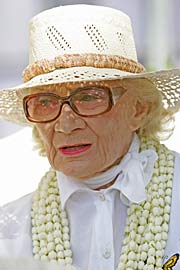Group challenges court order on artifacts
Hui Malama says the federal ruling violates its right to freedom of religion
Honolulu Star-Bulletin
Friday, September 9, 2005
By Sally Apgar
Edward Ayau: Says removing the artifacts is like "stealing from the dead"
David Ezra: Bishop Museum "breached its own policies," the judge rules
La'akea Suganuma: The lawsuit claimant says relics face "imminent harm"
Abigail Kawananakoa: Royal descendent says artifacts were loaned improperlyA federal court order demanding the return of 83 artifacts reburied in a Big Island cave five years ago would violate Hui Malama I Na Kupuna 'O Hawaii Nei's constitutional right to freedom of religion, the native Hawaiian group argued yesterday.
Earlier this week, U.S. District Judge David Ezra gave Hui Malama, a group founded in 1989 to repatriate native Hawaiian remains and artifacts, until Sept. 23 to return the burial items, or "moepu." The group reburied the items in Kawaihae in 2000 to honor the wishes of kupuna (ancestors). Ezra ordered the return so that 14 competing native Hawaiian claimants can have equal say in the fate of the items.
Hui Malama filed an emergency appeal of the order with the 9th U.S. Circuit Court of Appeals in San Francisco yesterday, arguing, "There is no safe manner by which to carry out the (U.S.) District Court's order as it would place ... members of Hui Malama in real physical and spiritual danger."
In a declaration filed yesterday supporting their argument, Edward Halealoha Ayau, a founding member of Hui Malama, said that complying with the court order "would inflict spiritual, emotional, religious and emotional injury upon me and members of Hui Malama."
"Specifically, it would be an extreme hewa (wrong) for me or any other Hui Malama member, if ordered, to take part in any effort to enter the Kawaihae burial cave, with two to three known caves, to remove the 83 moepu, as they belong to the kupuna buried therein," and that would harm "the integrity of the afterlife of these kupuna," he said.
It "amounts to stealing from the dead, an action that threatens severe spiritual consequences for anyone involved," Ayau added.
Ezra's order arises from a recent case filed by two other native Hawaiian groups against Hui Malama and the Bishop Museum demanding return of the items so that 14 federally recognized native Hawaiian claimants could be consulted in what to do with the items.
In 1905 three men, including David Forbes, whom Hui Malama refer to as grave robbers, opened the cave and gave the items to the Bishop Museum, an act that Hui Malama considers a desecration that they needed to right. In a controversial 2000 "loan," Hui Malama obtained possession of the items.
There is a sharp split in the claimants' groups over whether the items should be buried in the cave to honor kupuna and allowed to decay, or whether they should be preserved in a hermetically sealed environment for the eyes of future native Hawaiian generations.
The two native Hawaiian groups contesting Hui Malama's claim are represented by La'akea Suganuma, a practitioner of "lua," or "bone-breaking," an ancient form of Hawaiian martial arts, who is also president of the Royal Hawaiian Academy of Traditional Arts; and Na Lei Alii Kawananakoa, a group founded by Abigail Kawananakoa, a wealthy Campbell Estate heir and descendent of royal Hawaiian blood.
The 14 competing claimants, including Suganuma, Hui Malama and Kawananakoa, are recognized under the Native American Graves and Repatriation Act, which was passed into law in 1991 to govern the repatriation of native Hawaiian and American Indian remains and artifacts.
When Suganuma and Kawananakoa filed the suit, they asked for a preliminary injunction, demanding the return of the items, saying they were "improperly loaned" to Hui Malama and that they faced "imminent harm" in Kawaihae Caves because of environmental conditions, insect attack and possible theft. Ezra granted the injunction this week.
According to court documents, the 83 items were crated and handed over by museum staff to representatives of Hui Malama on a Saturday in February 2000 with a notation that it was a one-year "loan" until February 2001 and pending the outcome of an ongoing NAGPRA consultation.
Ezra wrote that the museum "breached its own policies in an apparent, but inexplicable, rush to deliver the items to Hui Malama."
In Ezra's order he noted the loan was based on Hui Malama's assurances that all four of the claimants who were recognized at the time agreed to the reburial. Ezra wrote "that premise was false ... because they (the four claimants) did not agree to Hui Malama's ultimate plans."
Aside from spiritual or religious beliefs, Hui Malama has said it does not want to return the items because it would be handing them over to the museum, which they say "acted as a fence for the original grave robbers."
Hui Malama I Na Kupuna O Hawaii Nei
huimalama.tripod.comBishop Museum
www.bishopmuseum.orgU.S. Interior Dept. -NAGPRA
www.cr.nps.gov/nagpraOriginal article URL: http://starbulletin.com/print/?fr=/2005/09/09/news/story1.html



